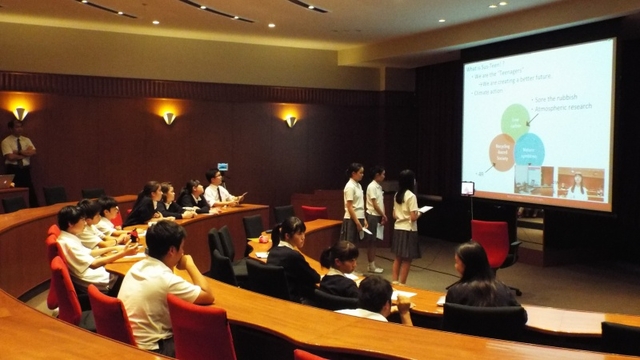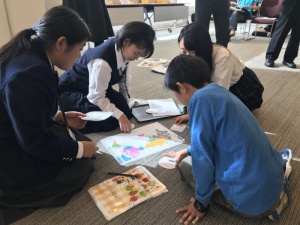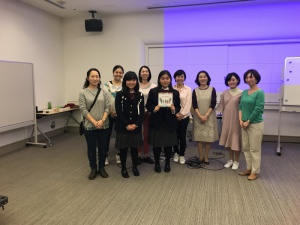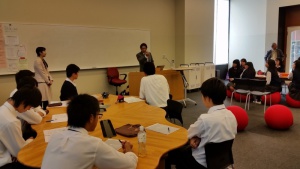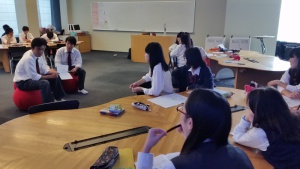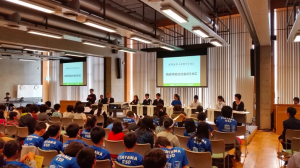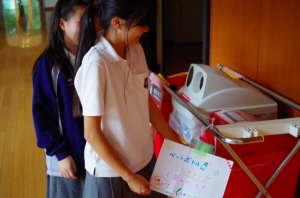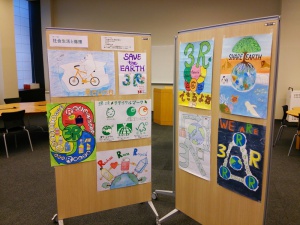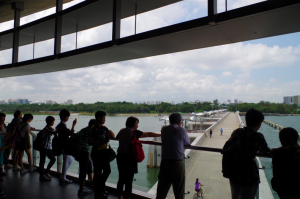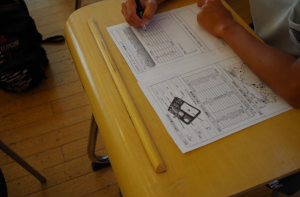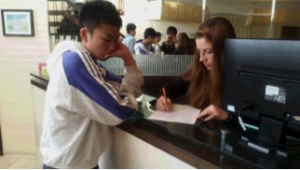[C]Environmental Aspects
JUNKAN Project Begins
The JUNKAN Project is an NIHS student-led social action project that encourages us to examine carefully our daily lifestyles and environment and to implement circles of sustainability.
【Report ⑨】
UNESCO Video Conference 2018.5.30, 6.13
Students in our school participated in a video conference with students from other countries through the UNESCO network of schools. Using “Skype” NIHS students participated in conference with students from Indonesia and Montenegro (May), followed by a second participation with students in Tokyo Ota Ward and Uganda schools (June). NIHS Sus-Teen! Members reported on the activities that they have been engaged in doing related to climate change. Performance of songs were also incorporated in the video exchange. Through this interaction ideas were shared among students across the globe. All the interaction happened in English and the Q&A served to tighten further the bonds of international friendship among students.
【Report ⑧】
JHS 1st and 2nd graders participation in the SDGs Children Workshop 2017.11.03
One JHS 1st grader and one JHS 2nd graders participated in the “SGDs Children Workshop” hosted by MEXT and ACCU. The workshop centered on the relation between imported goods and social issues. Students were introduced to issues of economic inequality, global disparity, and so forth. Activities involved discussion and global issues problem-solving ideas.
【Report ⑦】
Carbon Offset Study Session 2015.10.31
Representative Director Suzuki and Ms. Ogawa from WasteBox, Inc. visited NIHS to lead a study session with first-year senior high school students about carbon offsetting. WasteBox, Inc. is a business that facilitates the buying and selling of carbon credits. At the study session, students gathered in the Active Learning Lab and learned about carbon-offset products and about how the carbon credit scheme works. In the second half of the session, students engaged in role-play games involving selling and purchasing carbon credits. They discussed in small groups what they were learning. The students found it to be hard work to learn about unfamiliar products and engage in these carbon credit negotiations, but at the same time they learned some valuable information and ultimately enjoyed the experience.
【Report ⑥】
Presentation at Aichi Prefecture UNESCO Schools Meeting 2015.10.10.
NIHS students spent a Saturday at a meeting of students and teachers from Aichi Prefecture UNESCO Associated schools. The meeting was held at Expo Memorial Park. Students from the junior and senior high school participated. Junior high school students participated in a poster session. They prepared an attractive and informative poster for the occasion and explained its contents, which described recent activities during the language study class trip to London and student production of disaster evacuation maps. Senior high school students made a formal presentation introducing the NIHS fair trade coffee initiative and portable Emergency Toilet Kits designed by students. They also discussed future projects now in the planning stage. At a panel discussion, the students exchanged opinions about topics related to sustainable development.
【Report ⑤】
PET Bottle Cap Collection Campaign, Schoolwide Action 2015.6 (Ongoing)
In order to encourage recycling of plastic bottle caps, students have designed original Eco-Cap collection boxes and have placed them next to other recycling boxes and rubbish boxes around the school. At the Culture Festival, students will create artwork from recycled bottle caps and, after exhibiting the art pieces, will donate them to organizations carrying out bottle cap campaigns. Through this activity, students are acquiring the habit of separating garbage, appreciating the need to conserve resources and avoiding wastefulness.
【Report ④】
Environmental Preservation, 3R Posters: Thinking about Sustainable Use of Resources 2015.8
During the summer vacation, students prepared posters related to environmental preservation and the so-called “3R” strategies for minimizing waste (Reduce, Reuse, Recycle). In the junior high school, students focused on the “5R” strategies (Reduce, Reuse, Recycle, Refuse, Repair).
【Report ③】
Overseas Fieldwork, Thinking about Environmental Challenges 2015.7.15-2016.7.19
While visiting our sister school in Singapore, NIHS students made a special trip to observe the enormous and award-winning Marina Barrage Dam and Reservoir, built at the confluence of five rivers and opened in 2008 in order to provide drinking water and flood control. At an exhibition center on the site, students learned about and discussed Singapore’s water challenges and solutions and had a chance, more generally, to think about the vital importance of using our water resources intelligently and sustainably.
【Report ②】
General Studies Class, “Circles of Sustainability” Activity (All Students) 2015.6.1
During the required General Studies period on this date, students engaged in the three activities described below. Students focused on examining “food mileage” in the local context.
[Activity 1] How much do you know about the convenience stores in your neighborhood?
[Activity 2] Where do the contents of bento come from?
[Activity 3] Let’s calculate food mileage!
【Report ①】
Intercultural Fieldwork: Asking Foreigners for their Opinions 2015.4.1-2016.3
NIHS has implemented fieldwork for students designed to improve understanding of foreign cultures. Both in Japan and during trips overseas, students have conducted face-to-face opinion surveys of persons from foreign countries. Students choose subjects from all walks of life and of all ages. The survey includes seven questions designed to elicit opinions about circles of sustainability. For example, one question asks: “Do you think that your country is addressing environmental concerns and is a recycling society? If you answered yes, could you provide some reasons for giving this answer?” Students find that their subjects often ask them challenging questions in return, requiring them to use the English communication skills they have learned at our school. Students will collate results from surveys conducted both in Japan and in various countries around the world and present an analysis of the results at the end of the school year.
○ London Survey: May 8 through May 14, 2015


